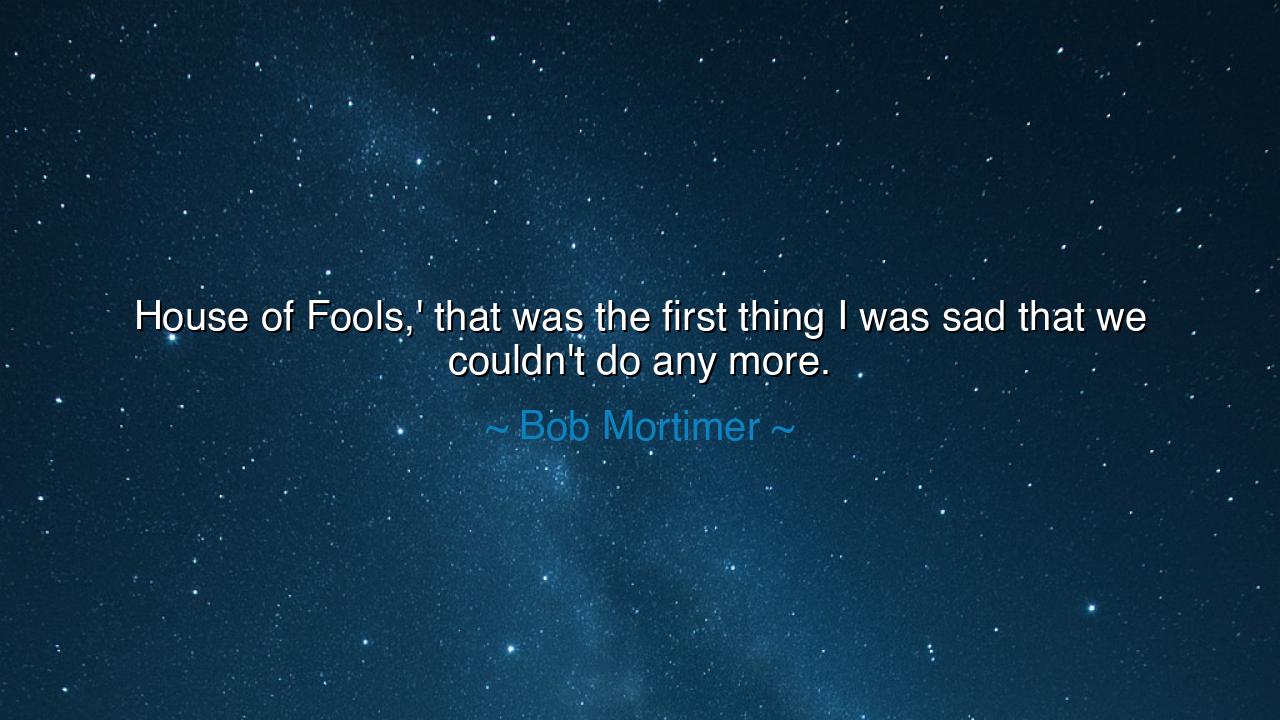
House of Fools,' that was the first thing I was sad that we






Bob Mortimer once confessed with gentle sorrow: “House of Fools, that was the first thing I was sad that we couldn’t do any more.” In this simple reflection lies a truth both ancient and eternal: all things, no matter how joyful, must one day pass. The laughter of the present becomes the memory of the past, and even the brightest fires eventually fade to embers. His words remind us that creation, no matter how brilliant, is bound by time’s hand.
The House of Fools was more than a show; it was a space of play, absurdity, and joy. For Mortimer, it was not just the loss of a project but the closing of a chapter in life—a home built of imagination, dismantled before his eyes. The sadness he speaks of is not only his own but the grief of every artist who has seen their creation end before they were ready. In it we hear the echo of the human heart: attachment to what we make, love for the fleeting beauty of shared laughter.
From the days of the ancients, storytellers have mourned the loss of their stages. Consider the great playwright Sophocles, whose tragedies filled the theaters of Athens. Though revered in his lifetime, many of his works are now lost to time, their words swallowed by centuries. Imagine the sorrow of knowing that creations once alive with voices, movement, and tears could vanish forever. Mortimer’s lament for House of Fools is part of that same eternal grief: the sadness of impermanence, of art cut short, of joy that could not last.
Yet, hidden within this sadness is also a celebration. For we do not grieve what we did not love. The ache Mortimer felt proves that House of Fools was precious, a thing of value, a creation that brought light into his life and the lives of others. In truth, every ending is a mirror that reveals the depth of our attachment. To mourn the loss of laughter is to prove that laughter was real, that it mattered, that it left an imprint on the soul.
The meaning of his words extends beyond art into all of life. We build families, friendships, journeys, and dreams, only to see some of them end before we are ready. The house where we grew up, the gatherings that once filled our days, the moments of joy we wish to preserve—all become memories. And in each ending, we must hold both sadness and gratitude. Sadness, because it is gone; gratitude, because it once was.
The lesson is clear: do not hold too tightly to what must pass, but do not fail to cherish it while it lives. Every endeavor—whether a show, a friendship, or a season of life—has its appointed time. When it ends, let your heart feel the loss, but let it also carry the joy forward. For though you cannot return to the House of Fools, you can build new houses of joy, new spaces of laughter, new creations that honor the spirit of what came before.
Practically, this means embracing impermanence. Celebrate your work, your relationships, your days while they are with you. When they pass, let the sorrow cleanse you, but do not let it harden you. Instead, let it teach you to seize the present more fiercely, to create anew, to build again. For the human soul is not meant to dwell only in endings, but to continually rise into fresh beginnings.
Thus, Bob Mortimer’s words are more than a memory of a show. They are a teaching on the bittersweet nature of life itself: that what we love most is always fleeting, and that the sadness of its loss is proof of its worth. May we, too, learn to honor what passes, grieve when we must, and yet keep building houses of joy, even in a world that never lets them stand forever.






AAdministratorAdministrator
Welcome, honored guests. Please leave a comment, we will respond soon